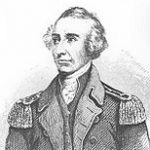 As with any war, there are opinions that are polar opposites from each other. After all, if they all agreed, there would be no need for war. The Revolutionary War was no different. Yes, the British wanted to keep the United States as colonies belonging to the crown, but the people of the United States would have none of it…well, most of the people anyway. It seems shocking to us now, to think that there would be people in the United States who would want us to remain under Britain’s rule, but in fact, there were. They were known as the Loyalists, and they set about doing whatever they could to cause the United States to lose the Revolutionary War.
As with any war, there are opinions that are polar opposites from each other. After all, if they all agreed, there would be no need for war. The Revolutionary War was no different. Yes, the British wanted to keep the United States as colonies belonging to the crown, but the people of the United States would have none of it…well, most of the people anyway. It seems shocking to us now, to think that there would be people in the United States who would want us to remain under Britain’s rule, but in fact, there were. They were known as the Loyalists, and they set about doing whatever they could to cause the United States to lose the Revolutionary War.
Patriot, Lieutenant Colonel Francis “The Swamp Fox” Marion was fresh from a victory at Nelson’s Ferry on the Santee River in South Carolina on August 20, 1780. Marion, who was just five feet tall, won fame and the “Swamp Fox” nickname for his ability to strike and then quickly retreat into the South Carolina swamps without a trace. Marion used irregular methods of warfare and is considered 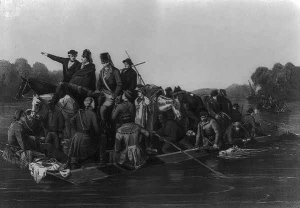 one of the fathers of modern guerrilla warfare and maneuver warfare, and is credited in the lineage of the United States Army Rangers. After the victory at Nelson’s Ferry, Marion and 52 of his militiamen rode east in order to escape the pursuing British Loyalists. They were successful, but during their escape, a second and much larger, force of Loyalists led by Major Micajah Ganey, attacked the militia from the northeast. Marion’s advance guard, led by Major John James, defeated Ganey’s advance guard and Marion ambushed the rest, causing Ganey’s main body of 200 Loyalists to flee in panic. The success of Marion’s militia broke the Loyalist stronghold on South Carolina east of the PeeDee River and attracted another 60 volunteers to the Patriot cause.
one of the fathers of modern guerrilla warfare and maneuver warfare, and is credited in the lineage of the United States Army Rangers. After the victory at Nelson’s Ferry, Marion and 52 of his militiamen rode east in order to escape the pursuing British Loyalists. They were successful, but during their escape, a second and much larger, force of Loyalists led by Major Micajah Ganey, attacked the militia from the northeast. Marion’s advance guard, led by Major John James, defeated Ganey’s advance guard and Marion ambushed the rest, causing Ganey’s main body of 200 Loyalists to flee in panic. The success of Marion’s militia broke the Loyalist stronghold on South Carolina east of the PeeDee River and attracted another 60 volunteers to the Patriot cause.
Marion rarely committed his men to frontal warfare, which was much more risky, but repeatedly surprised larger bodies of Loyalists or British regulars with quick surprise attacks and equally quick withdrawal from the  field. He was considered almost a ghost. Marion had previously earned fame as the only senior Continental officer in the area to escape the British following the fall of Charleston on May 12, 1780. His military strategy, while odd for the time, was really advanced for the time, and similar to some of today’s strategies. Marion took over the South Carolina militia force, first assembled by Thomas Sumter in 1780. Sumter returned home to bring Carolina Loyalists’ style terror tactics on the Loyalists who burned his plantation. After being wounded, Sumter withdrew from active fighting. Marion replaced him and teamed up with Major General Nathaniel Greene, who arrived in the Carolinas to lead the Continental forces in October 1780. Together, they are credited with pulling a Patriot victory from the jaws of defeat in the southern states.
field. He was considered almost a ghost. Marion had previously earned fame as the only senior Continental officer in the area to escape the British following the fall of Charleston on May 12, 1780. His military strategy, while odd for the time, was really advanced for the time, and similar to some of today’s strategies. Marion took over the South Carolina militia force, first assembled by Thomas Sumter in 1780. Sumter returned home to bring Carolina Loyalists’ style terror tactics on the Loyalists who burned his plantation. After being wounded, Sumter withdrew from active fighting. Marion replaced him and teamed up with Major General Nathaniel Greene, who arrived in the Carolinas to lead the Continental forces in October 1780. Together, they are credited with pulling a Patriot victory from the jaws of defeat in the southern states.

 No parent is really ready for their child to start dating. You expect that there will be a long line of possible spouses that come through the doors of your home. You somehow never expect the first person they date, to become a fixture in your life, and most of the time you would be right, but when our daughter, Corrie Petersen met her now husband, Kevin Petersen, it was love at first sight. She never had any doubt that this was a forever kind of love, but Kevin became so much more to our family. Looking back, I still find myself just amazed at how Kevin seemed to instantly “fit” into our family. In fact, he fit so well, that he became like a son to Bob and me too, and since it has been almost 25 years now, I guess my 15 year old daughter knew love when she found it.
No parent is really ready for their child to start dating. You expect that there will be a long line of possible spouses that come through the doors of your home. You somehow never expect the first person they date, to become a fixture in your life, and most of the time you would be right, but when our daughter, Corrie Petersen met her now husband, Kevin Petersen, it was love at first sight. She never had any doubt that this was a forever kind of love, but Kevin became so much more to our family. Looking back, I still find myself just amazed at how Kevin seemed to instantly “fit” into our family. In fact, he fit so well, that he became like a son to Bob and me too, and since it has been almost 25 years now, I guess my 15 year old daughter knew love when she found it.
Kevin told me once that my younger daughter, Amy Royce was the little sister he never had. Kevin showed me just how much he loved both of my girls, when he would come to pick them up for school almost everyday until Corrie got her license…she was after all, 15 years old when they started dating, so she couldn’t drive. He never made Amy ride the bus. She was included too, because she was his little sister. I still see that with Kevin, in the way he teases Amy, or comments on her Facebook page, or just when they are talking. Kevin has been her brother longer that she ever lived without him in her life. That really makes him more her brother, than her brother-in-law. I couldn’t have asked for a better “brother” for Amy either. They are very close, and that is a blessing for both of them. They each became the sibling the other was missing, not because they didn’t have a sibling of their own, because they did, but Kevin didn’t have a sister, and Amy didn’t have a brother.
Kevin has had some health struggles over the past few years, and that has made it difficult for him to do the projects that he loves, whether it be cars or around the house. Still, he doesn’t give up. He may have to rest more often than he used to, but he just takes it one step at a time, and soon the project is done. Of course, it 
 doesn’t hurt that Kevin and Corrie have two sons, Chris and Josh, who can come to help their dad with some of the things he needs help with. It not only gets the project done, but allows Kevin, and Corrie too, to see their very busy boys, who now have a place of their own. Kevin is such a family man, it really blesses him when the boys are willing to come and help him, even if he wishes he didn’t need help. Sometimes though, we all have to accept a little help from those around us, whether we like it or not. Today is Kevin’s birthday. Happy birthday Kevin!! Have a great day!! We love you!!
doesn’t hurt that Kevin and Corrie have two sons, Chris and Josh, who can come to help their dad with some of the things he needs help with. It not only gets the project done, but allows Kevin, and Corrie too, to see their very busy boys, who now have a place of their own. Kevin is such a family man, it really blesses him when the boys are willing to come and help him, even if he wishes he didn’t need help. Sometimes though, we all have to accept a little help from those around us, whether we like it or not. Today is Kevin’s birthday. Happy birthday Kevin!! Have a great day!! We love you!!
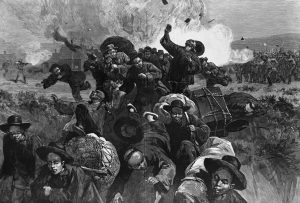 In 1885, coal miners in Rock Springs, Wyoming Territory were trying to unionize, and were trying to strike for better working conditions, but the Union Pacific Railroad company had been besting them in their efforts for a long time. In those days, the companies often had the advantage over the workers. Working conditions suffered as a result of this disadvantage. Unions and companies were constantly at odds, for obvious reasons. I suppose that in any business, there are good and bad people. Sometimes, when people come into power in an organization, corruption follows. The companies of that time didn’t want to do what was necessary to make working in the mines safe, and as most people know, underground mining can be a very dangerous occupation. The chance of cave ins or explosions exists in even the safest mines, as well as having poisonous gasses leaking into the limited air supply, bringing death to the miners.
In 1885, coal miners in Rock Springs, Wyoming Territory were trying to unionize, and were trying to strike for better working conditions, but the Union Pacific Railroad company had been besting them in their efforts for a long time. In those days, the companies often had the advantage over the workers. Working conditions suffered as a result of this disadvantage. Unions and companies were constantly at odds, for obvious reasons. I suppose that in any business, there are good and bad people. Sometimes, when people come into power in an organization, corruption follows. The companies of that time didn’t want to do what was necessary to make working in the mines safe, and as most people know, underground mining can be a very dangerous occupation. The chance of cave ins or explosions exists in even the safest mines, as well as having poisonous gasses leaking into the limited air supply, bringing death to the miners.
The situation took a deadly turn on September 2, 1885, when 150 white miners brutally attacked their Chinese coworkers, killing 28 and wounding 11 others, while driving several others out of town. The Chinese weren’t really the problem, except that they were hard workers, and so the company had initially decided to bring them in as strikebreakers. The Chinese workers showed very little interest in the miners’ union, and I’m sure this 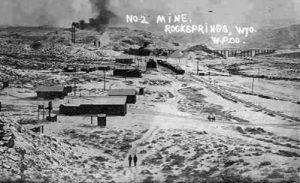 made the rest of the miners very angry. The miners became outraged by a company decision to allow the Chinese miners to work in the richest coal mines, and before long, the situation turned into a mob of white miners deciding to strike back by attacking the small area of Rock Springs known as Chinatown.
made the rest of the miners very angry. The miners became outraged by a company decision to allow the Chinese miners to work in the richest coal mines, and before long, the situation turned into a mob of white miners deciding to strike back by attacking the small area of Rock Springs known as Chinatown.
When the Chinese saw the white miners coming, most of them abandoned their homes and business, running for the hills. Those who failed to get out in time were brutally beaten, and 28 of them, beaten to death. One week later, on September 9, United States troops escorted the surviving Chinese back into the town where many of them returned to work. I guess they were either very loyal, desperate for the money, or had no other real choices, because I can’t imagine going back to work in that situation. Eventually the Union Pacific fired 45 of the white miners for their roles in the massacre, but no effective legal action was ever taken against any of the participants…no repercussion for the brutal murder of 28 Chinese men.
I wound never agree with murder, but it was also wrong to use the Chinese in this way. By bringing them in as strikebreakers, the Union Pacific Railroad effectively caused the anti-Chinese sentiment that was shared by  many, and began to come to the West in the mid-nineteenth century, fleeing famine and political upheaval in their own country. The Chinese were many Americans at that time. The Chinese had been victims of prejudice and violence ever since they first widely blamed for all sorts of social ills. They were also singled-out for attack by some national politicians who popularized strident slogans like “The Chinese Must Go” and helped pass an 1882 law that closed the United States to any further Chinese immigration. The Rock Springs massacre was just another symptom in this climate of racial hatred, violent attacks against the Chinese in the West became all too common. But, the Rock Springs massacre was the worst, both for its size and savage brutality.
many, and began to come to the West in the mid-nineteenth century, fleeing famine and political upheaval in their own country. The Chinese were many Americans at that time. The Chinese had been victims of prejudice and violence ever since they first widely blamed for all sorts of social ills. They were also singled-out for attack by some national politicians who popularized strident slogans like “The Chinese Must Go” and helped pass an 1882 law that closed the United States to any further Chinese immigration. The Rock Springs massacre was just another symptom in this climate of racial hatred, violent attacks against the Chinese in the West became all too common. But, the Rock Springs massacre was the worst, both for its size and savage brutality.
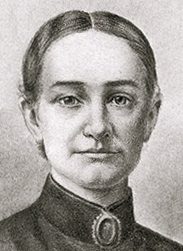 The old West was a rugged, unforgiving place, and for a long time it was thought to be a man’s place, and completely unsafe for women. Men went west, mined for gold, and came home to their families. A man would have to be insane to bring his wife and children to the West. Nevertheless, it was really only a matter of time before someone decided that the west was going to be settled, and it was going to take both men and women to settle the West…otherwise it was always going to be a job site and not a home. Someone had to make the first move, and I can imagine how the parents of those first women must have felt when their daughters told them they were moving out west. It must have been like thinking, “who was this idiot their daughter has married!” Of course, women had come as far as the Rocky Mountains, so going further wasn’t that strange, but it was still the unknown.
The old West was a rugged, unforgiving place, and for a long time it was thought to be a man’s place, and completely unsafe for women. Men went west, mined for gold, and came home to their families. A man would have to be insane to bring his wife and children to the West. Nevertheless, it was really only a matter of time before someone decided that the west was going to be settled, and it was going to take both men and women to settle the West…otherwise it was always going to be a job site and not a home. Someone had to make the first move, and I can imagine how the parents of those first women must have felt when their daughters told them they were moving out west. It must have been like thinking, “who was this idiot their daughter has married!” Of course, women had come as far as the Rocky Mountains, so going further wasn’t that strange, but it was still the unknown.
On this day in 1836, Narcissa Whitman arrived in Walla Walla, Washington, becoming one of the first Anglo women to settle west of the Rocky Mountains. Narcissa and Marcus Whitman, along with their close friends Eliza and Henry Spalding, had departed from New York earlier that year on the long overland journey to the far western edge of the continent. These days, that trip can be 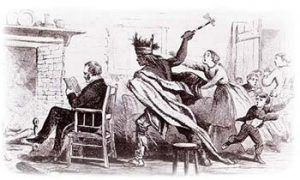 made in a matter of hours, but in those days, it took lots of planning and months to accomplish such a trip. The two couples were missionaries, and Narcissa wrote that they were determined to convert the “benighted ones” living in “the thick darkness of heathenism” to Christianity. I guess there was no specific word for Indians, or Native Americans back then, or she just liked her version better. Mission work was one of the big reasons for heading west…besides land, and gold, of course.
made in a matter of hours, but in those days, it took lots of planning and months to accomplish such a trip. The two couples were missionaries, and Narcissa wrote that they were determined to convert the “benighted ones” living in “the thick darkness of heathenism” to Christianity. I guess there was no specific word for Indians, or Native Americans back then, or she just liked her version better. Mission work was one of the big reasons for heading west…besides land, and gold, of course.
That summer when they crossed the continental divide at South Pass, Narcissa and Eliza became the first Anglo-American women in history to travel west of the Rocky Mountains. I suppose it was like going to another planet to the women, who went with no real idea of what they would be facing in the new frontier. Toward the end of their difficult 1,800 mile journey, the two couples split up, with the Spaldings heading for Idaho while 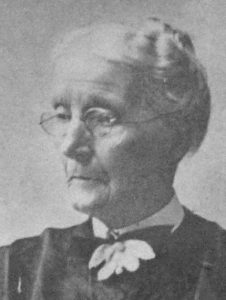 Narcissa and her husband traveled to a settlement near present-day Walla Walla, Washington, where they established a mission for the Cayuse Indians. I can only imagine how the two women must have felt, knowing that it would be a very long time before they had the company of another Anglo woman. For 11 years the couples’ missionary work went well, and they succeeded in converting many of the Cayuse to Christianity. Then in 1847, a devastating measles epidemic swept through the area, killing many of the Cayuse, who had no immunity to the disease, while leaving most of the white people at the mission suspiciously unharmed. Convinced that the missionaries or their god had cursed them with an evil plague, a band of the Cayuse Indians attacked the mission and killed 14 people, including Narcissa and her husband on November 29, 1847. Narcissa Whitman thus became not only one of the first white women to live in the Far West, but also one of the first white women to die there too. She was just 39 years old at the time she was murdered.
Narcissa and her husband traveled to a settlement near present-day Walla Walla, Washington, where they established a mission for the Cayuse Indians. I can only imagine how the two women must have felt, knowing that it would be a very long time before they had the company of another Anglo woman. For 11 years the couples’ missionary work went well, and they succeeded in converting many of the Cayuse to Christianity. Then in 1847, a devastating measles epidemic swept through the area, killing many of the Cayuse, who had no immunity to the disease, while leaving most of the white people at the mission suspiciously unharmed. Convinced that the missionaries or their god had cursed them with an evil plague, a band of the Cayuse Indians attacked the mission and killed 14 people, including Narcissa and her husband on November 29, 1847. Narcissa Whitman thus became not only one of the first white women to live in the Far West, but also one of the first white women to die there too. She was just 39 years old at the time she was murdered.
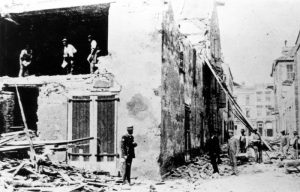 For some reason, there are certain areas on the United States, and the world, where earthquakes are…unexpected. There are just no real fault lines in these places, and no man-made reasons for it, like mining or drilling. So often people think they live in an area that is completely safe from an earthquake. Nevertheless, that does not mean that an earthquake can’t happen, as the people of Charleston, South Carolina found out on August 31, 1886.
For some reason, there are certain areas on the United States, and the world, where earthquakes are…unexpected. There are just no real fault lines in these places, and no man-made reasons for it, like mining or drilling. So often people think they live in an area that is completely safe from an earthquake. Nevertheless, that does not mean that an earthquake can’t happen, as the people of Charleston, South Carolina found out on August 31, 1886.
The first indicator that something strange was going on, came on August 27 and 28, when foreshocks were felt in Summerville, South Carolina, where my first cousin once removed, Stephanie Willard and her family live. While the tremors were odd, the people of the area didn’t think they were a warning for what was coming. Then, at 9:51pm on August 31, the rumbling began. The 7.6 magnitude quake was felt as far away as Boston, Chicago and Cuba. Buildings as far away as far away as Ohio and Alabama were damaged. But, it was Charleston, South Carolina, that took the biggest hit from the quake. Almost all of the buildings in town were seriously damaged. About 14,000 chimneys fell from the earthquake’s shaking. It caused multiple fires, and 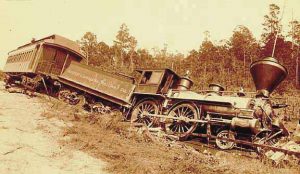 water lines and wells were ruptured. The total damage was in excess of $5.5 million, which would be about $112 million today.
water lines and wells were ruptured. The total damage was in excess of $5.5 million, which would be about $112 million today.
While that was a disaster in itself, it was the loss of life that was felt the worst. More that 100 people lost their lives that fateful day, and countless others were injured, in what is still the largest recorded earthquake in the history of the southeastern United States. The quake damaged as many as 2,000 buildings, including buildings as far away as central Alabama, central Ohio, eastern Kentucky, southern Virginia and western West Virginia. The strange part about this quake is the fact that there were no apparent surface cracks as a result of this tremor, railroad tracks were bent in all directions in some locations. Acres of land were liquefied. This quake remained a mystery for many years since there were no known underground faults for 60 miles in any direction. Then, as science and detection methods got better, scientists have recently uncovered a concealed fault along the coastal plains of Virginia and the Carolinas. While this fault is now known, scientists think that another quake of this magnitude remains highly 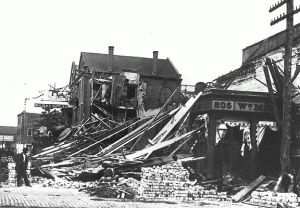 unlikely, though not impossible, in this location.
unlikely, though not impossible, in this location.
I guess I don’t quite understand that concept, except to say that if it is the only fault and has nothing to connect to, maybe there is less chance of a small tremor turning into a big quake, and maybe that is why they don’t expect another quake of that magnitude. Still, it is always good advise to realize that no place is immune to earthquakes. Oklahoma has found that out in recent years, as underground mining work has created quake situations that weren’t there before. It is still my hope that the Charleston area never has another quake like the one they had in 1886.

 Last night as my husband, Bob and I were heading out for our evening walk at about 7:15pm, we were met by a concerto of song coming from the pine tree in our next door neighbor’s yard. Of course, it was the birds settling down for the night, since it was heading into the evening hours. I was immediately reminded of the day of the total eclipse that Casper had just been in the center of. As the sky grew darker, the birds began hurrying to and fro in search of their places for the night. They began singing their evening songs, just as they were doing when we stepped out of our front door last night. Birds, of course, are programmed to begin bedtime preparations as the daylight starts to fade, unlike humans who might not go to sleep until the wee hours of the morning.
Last night as my husband, Bob and I were heading out for our evening walk at about 7:15pm, we were met by a concerto of song coming from the pine tree in our next door neighbor’s yard. Of course, it was the birds settling down for the night, since it was heading into the evening hours. I was immediately reminded of the day of the total eclipse that Casper had just been in the center of. As the sky grew darker, the birds began hurrying to and fro in search of their places for the night. They began singing their evening songs, just as they were doing when we stepped out of our front door last night. Birds, of course, are programmed to begin bedtime preparations as the daylight starts to fade, unlike humans who might not go to sleep until the wee hours of the morning.
The concerto also reminded me of one of my sister, Cheryl Masterson’s favorite movies…The Sound of Music. Of course, the song they sang on that movie was The Hills Are Alive, and not The Trees Are Alive, but my imagination is allowed to make those little changes…basically taking a little poetic license, and change the wording a little bit to fit the situation. So, while I heard the melody of The Hills Are Alive, the words that sang out were The Trees Are Alive.

Since we began taking evening walks a number of years ago, we have found ourselves rather fascinated with the animal life around us. The birds flying here and there, with what appears to be no specific destination in mind; the rabbit with a broken leg that has managed to survive most of the summer, even though he can’t hop as fast as so many other rabbits; the dogs who are sure that we are their friends, even to the point of vying for our attention with the other dogs in their yard or next door; and even the deer, who stand and watch us, not moving unless we do something to appear to be coming toward them. They are all very interesting in the way they interact with people. The birds don’t seem to want to fly too far from their original spot to get away from us as we approach, almost as if they are saying, “I’m not scared of you.” The rabbits sit bravely still, hoping that we won’t notice them, sometimes allowing us to get only a foot or so away from them, providing we continue to walk along without stopping.
Animals are funny sometimes, doing things that almost seem like human activities, and even the wild animals 
 who seem to want to interact with humans…from a safe distance, anyway. The mourning doves and other birds that like to look at us from their safe perch on the power lines or light poles above us, always strike me as funny. They know we are there, and they seem curious about us, but they don’t want to get too close, after all they aren’t stupid, just curious, as they allow us to share their space. And of course, there is nature’s version of Twitter…when a large group of birds flock to one tree, and everyone is tweeting at once…as was the case when we left for our evening walk last night.
who seem to want to interact with humans…from a safe distance, anyway. The mourning doves and other birds that like to look at us from their safe perch on the power lines or light poles above us, always strike me as funny. They know we are there, and they seem curious about us, but they don’t want to get too close, after all they aren’t stupid, just curious, as they allow us to share their space. And of course, there is nature’s version of Twitter…when a large group of birds flock to one tree, and everyone is tweeting at once…as was the case when we left for our evening walk last night.

 As my father-in-law, Walt Schulenberg’s birthday approached this year, I have found myself thinking a lot about the man who was like a second dad to me for 38 years. As with my parents, I still find it hard to believe that he is gone, and yet it has been more than four years already. There are many things I really miss about my father-in-law. One of the main ones would be his smile. Whenever we were at his house, he was always so genuinely happy to see us, and his smile made that so clear. He had a great sense of humor and loved to laugh. He was an experienced teaser, and since I come from a family of teasers, we always got along well. In his last years, I had the privilege of taking care of him, and I can honestly say that it was a privilege, and a blessing to be able to spend that time with him. We talked about family history a lot, and he helped me to fill in a lot of the holes in that side of the family. And we just talked about life and the past. Those were sweet times.
As my father-in-law, Walt Schulenberg’s birthday approached this year, I have found myself thinking a lot about the man who was like a second dad to me for 38 years. As with my parents, I still find it hard to believe that he is gone, and yet it has been more than four years already. There are many things I really miss about my father-in-law. One of the main ones would be his smile. Whenever we were at his house, he was always so genuinely happy to see us, and his smile made that so clear. He had a great sense of humor and loved to laugh. He was an experienced teaser, and since I come from a family of teasers, we always got along well. In his last years, I had the privilege of taking care of him, and I can honestly say that it was a privilege, and a blessing to be able to spend that time with him. We talked about family history a lot, and he helped me to fill in a lot of the holes in that side of the family. And we just talked about life and the past. Those were sweet times.
My father-in-law was always there to pitch in and lend a helping hand. He worked hard until the job was done. I always called him a workaholic, and I wasn’t kidding, nor was I wrong. He instilled that same work ethic in his children, all of whom are hard workers too. His philosophy was that you should work hard until the job was done, and done right. He believed that if a job was worth doing, it was worth doing right. He took that work ethic with him to the various job he did over the years, and each one was very sorry to see him move on.
He worked hard, but the really important thing in his life was his family. They were his top priority. He loved every baby, grandbaby, and great grandbaby with all his heart. He made toys for them, played games with them, and let them “help” with the jobs he was working on at home, teaching them the ropes as they went 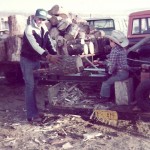
 along. Every one of the kids and grandkids had a chance to help Grandpa with his work, and they all loved to be able to do so. He never made them feel like they were in the way. Of course, they most enjoyed playing with him, but what child wouldn’t? He was a dear dad and grandfather to every one of the children and grandchildren, a well as to his sons and daughters-in-law. I feel very privileged to have known him. Today would have been my father-in-law’s 88th birthday. I wish he were here so we could all celebrate it with him. Happy birthday in Heaven Dad. We love and miss you very much.
along. Every one of the kids and grandkids had a chance to help Grandpa with his work, and they all loved to be able to do so. He never made them feel like they were in the way. Of course, they most enjoyed playing with him, but what child wouldn’t? He was a dear dad and grandfather to every one of the children and grandchildren, a well as to his sons and daughters-in-law. I feel very privileged to have known him. Today would have been my father-in-law’s 88th birthday. I wish he were here so we could all celebrate it with him. Happy birthday in Heaven Dad. We love and miss you very much.
 My niece, Lindsay Moore is a private consultant for South Dakota State University, Michigan State University, University of Missouri, Purdue University, University of Nebraska-Lincoln, and Ohio State University, serving as their Project Coordinator for all states. She basically manages their project and research activities and personnel, focusing mainly on South Dakota, Iowa, Ohio, Kansas, Minnesota, and Michigan. She was originally employed at South Dakota State University, but when her husband, Shannon took a new job at Miami International University in Miami, Florida, it looked like Lindsay was going to have to find a new job, but her boss, Suzanne hated to lose such a valuable employee, so she went to work to find a way for Lindsay to work as a private consultant. The job took off and expanded to include several other universities, and it have been quite successful for all concerned, and it worked out especially well when Lindsay’s husband took a new job at Special Teams Coordinator and Tight Ends coach at East Carolina
My niece, Lindsay Moore is a private consultant for South Dakota State University, Michigan State University, University of Missouri, Purdue University, University of Nebraska-Lincoln, and Ohio State University, serving as their Project Coordinator for all states. She basically manages their project and research activities and personnel, focusing mainly on South Dakota, Iowa, Ohio, Kansas, Minnesota, and Michigan. She was originally employed at South Dakota State University, but when her husband, Shannon took a new job at Miami International University in Miami, Florida, it looked like Lindsay was going to have to find a new job, but her boss, Suzanne hated to lose such a valuable employee, so she went to work to find a way for Lindsay to work as a private consultant. The job took off and expanded to include several other universities, and it have been quite successful for all concerned, and it worked out especially well when Lindsay’s husband took a new job at Special Teams Coordinator and Tight Ends coach at East Carolina  University, bringing a move to Greenville, North Carolina. It is really nice that Lindsay doesn’t have to look for a new job every time her husband takes a better job, which is very common for football coaches.
University, bringing a move to Greenville, North Carolina. It is really nice that Lindsay doesn’t have to look for a new job every time her husband takes a better job, which is very common for football coaches.
Part of Lindsay’s job includes speaking at conferences in different location in the United States and even in Canada. She has made trips, with her boss, Suzanne, to Victoria, Canada; Washington DC; and her latest trip was to California, where Lindsay spoke at a conference about food availability for under privileged communities and helping make healthy food available for those who are unable to get it. They use a power point presentation and present the way their six states are helping people get healthy food instead of just commodities, and they do studies with communities for ways to help people get and stay active. Lindsay is an avid nutritionist and exercise expert focusing on how the body moves. She received her Bachelor’s Degree in  Kinesiology and Health Promotion, and then her Masters degree in Nutrition, Exercise, and Food Science, making her the perfect person to head up the projects concerning food availability, good nutrition, and exercise.
Kinesiology and Health Promotion, and then her Masters degree in Nutrition, Exercise, and Food Science, making her the perfect person to head up the projects concerning food availability, good nutrition, and exercise.
Lindsay really enjoys working from home. It provides her with the freedom to travel with her husband on his scouting trips, take vacations during the summer while he is off work, and go to see her family in Casper, Wyoming several times a year, and when she and Shannon begin having a family, they won’t even need a babysitter. It’s a pretty sweet deal, and a far cry from her original plan of becoming…a firefighter!! Today is Lindsay’s birthday. Happy birthday Lindsay!! Have a great day!! We love you!!
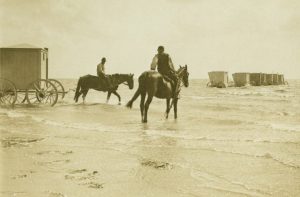 In the 18th and 19th century, going swimming was not done in the same way as it was today. While it was considered ok to swim, the clothing was not considered appropriate, and so men and women were segregated during swimming. I don’t suppose going to the beach was as common, and so it problem might not have come up every day, but it came up enough to create a need for a “proper” way to accomplish an outing involving swimming. Enter the Bathing Machine. The bathing machine was basically a small room built on wheels that could be taken to the beach. People entered the machine while it was on the beach, wearing their street clothing. In the machine they changed into their bathing suit, although men were allowed to bathe nude until the 1860s. They then placed their street clothes into a raised compartment in the bathing machine, where they would remain safe and dry.
In the 18th and 19th century, going swimming was not done in the same way as it was today. While it was considered ok to swim, the clothing was not considered appropriate, and so men and women were segregated during swimming. I don’t suppose going to the beach was as common, and so it problem might not have come up every day, but it came up enough to create a need for a “proper” way to accomplish an outing involving swimming. Enter the Bathing Machine. The bathing machine was basically a small room built on wheels that could be taken to the beach. People entered the machine while it was on the beach, wearing their street clothing. In the machine they changed into their bathing suit, although men were allowed to bathe nude until the 1860s. They then placed their street clothes into a raised compartment in the bathing machine, where they would remain safe and dry.
I believe that all bathing machines had small windows, but one writer in the Manchester Guardian of May 26, 1906 considered them “ill-lighted” and wondered why bathing machines were not improved with a skylight. Once the person had changed, the machine would be wheeled or slid into the water. The most common type of these machines had large wide wheels and were pulled in and out of the surf by a horse or a pair of horses with a driver, but there were some that were pushed in and out of the water by human power. Some resorts had wooden rails into the water for the wheels to roll on, and a few had bathing machines pulled in and out by cables propelled by a steam engine.
Once the machine was in the water, the occupants stepped out from the sea side, and proceeded down steps into the water. Many of the machines had doors front and back, but those with only one door would be backed into the sea or need to be turned around. The most essential element of the machines, was that it blocked any view of the bather from the shore. Some of the more luxurious machines were equipped with a canvas tent lowered from the seaside door, sometimes capable of being lowered to the water, giving the bather greater privacy. Bathing machines would often be equipped with a small flag which could be raised by the bather as a signal to the driver that they were ready to return to shore. Some resorts even employed a dipper, a strong 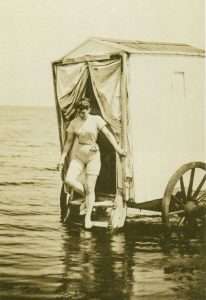 person of the same sex who would assist the bather in and out of the sea. Some dippers were said to push bathers into the water, then yank them out, considered part of the experience. Wow!! I’m not sure I would like that much, but then, to me this whole process seems like it would make the idea of bathing a bit too much of an undertaking, not to mention the added cost to go swimming, because I don’t think anyone would operate a bathing machine for free.
person of the same sex who would assist the bather in and out of the sea. Some dippers were said to push bathers into the water, then yank them out, considered part of the experience. Wow!! I’m not sure I would like that much, but then, to me this whole process seems like it would make the idea of bathing a bit too much of an undertaking, not to mention the added cost to go swimming, because I don’t think anyone would operate a bathing machine for free.
Bathing machines were most commonly used in the United Kingdom and parts of the British Empire with a British population, but were also used in France, Germany, the United States, Mexico, and other nations. Legal segregation of bathing areas in Britain ended in 1901, and the bathing machine declined rapidly. By the start of the 1920s, bathing machines were almost extinct, even on beaches catering to an older clientele. For those of us who grew up in the modern era, this process would seem like a bit of insanity, but then that was simply a different time.

 When people hear the word step-dad, it doesn’t usually come with a lot of good feelings. Most people think of a guy who married a woman with a child, and really wishes she didn’t have that child, but with my niece, Susan Griffith’s husband, Josh, they would be wrong. When Susan met Josh, she didn’t know how he would feel about her daughter, Jala Satterwhite. Susan needn’t have worried. Josh stepped into Jala’s life and became the dad, that he didn’t have to be. Jala has a dad, but if she was going to be happy with her mom’s husband, there was going to have to be something in it for her too. That’s all any child wants…to be accepted and loved, as if their step-dad were their biological dad. When Josh became Jala’s step-dad, he took his role very seriously, and he became a great father figure for Jala. She never feels like his step-daughter, because he has never made her feel that way. Josh and Susan have another daughter, Kaytlyn too, and Josh loves both girls the same. They have never felt different.
When people hear the word step-dad, it doesn’t usually come with a lot of good feelings. Most people think of a guy who married a woman with a child, and really wishes she didn’t have that child, but with my niece, Susan Griffith’s husband, Josh, they would be wrong. When Susan met Josh, she didn’t know how he would feel about her daughter, Jala Satterwhite. Susan needn’t have worried. Josh stepped into Jala’s life and became the dad, that he didn’t have to be. Jala has a dad, but if she was going to be happy with her mom’s husband, there was going to have to be something in it for her too. That’s all any child wants…to be accepted and loved, as if their step-dad were their biological dad. When Josh became Jala’s step-dad, he took his role very seriously, and he became a great father figure for Jala. She never feels like his step-daughter, because he has never made her feel that way. Josh and Susan have another daughter, Kaytlyn too, and Josh loves both girls the same. They have never felt different.
Josh is pretty good at making people feel comfortable, and less fearful. I guess it’s a knack he has. When he and Susan first met, she was really afraid of 4 wheelers. Josh came up with a way to ease Susan into the idea by starting with horses. I’m not sure how horses could ease the fear of 4 wheelers, but maybe it’s because both of them eliminate the closed in feel of a car. One thing they have found is that horses are expensive…but as with any hobby that a person loves, the horses are worth every penny. They bring the family joy and they get them out in nature, and in that way they are truly a blessing.
Josh is an avid outdoorsman. He is really at home in the mountains. The family stays very busy in the summer, trying to cram as much fun and activity into the few short months before the girls go back to school, and winter arrives. They go camping, fishing, horseback riding in the Beartooth Mountains every other weekend. In fact, living in the mountains would not be out of the question, except that the kids have all their activities. Maybe 
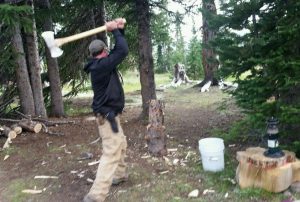 someday, when the girls are grown and on their own, that dream can become a reality, but for now, they know that the kids need school and friends. For Susan, it is clear…she and Josh will be together forever, because they are true soul mates. They are both going in the same direction, and the are very happy with their traveling companion on life’s journey. Today is Josh’s birthday. Happy birthday Josh!! Have a great day!! We love you!!
someday, when the girls are grown and on their own, that dream can become a reality, but for now, they know that the kids need school and friends. For Susan, it is clear…she and Josh will be together forever, because they are true soul mates. They are both going in the same direction, and the are very happy with their traveling companion on life’s journey. Today is Josh’s birthday. Happy birthday Josh!! Have a great day!! We love you!!

